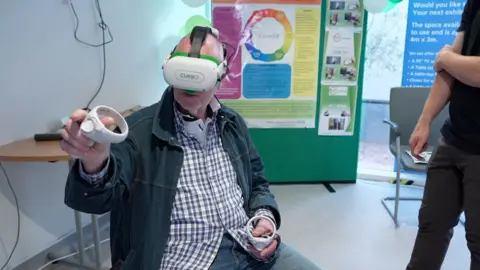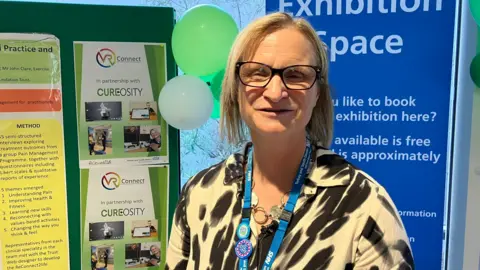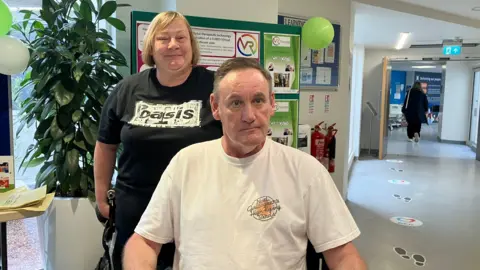Virtual reality therapy 'helps cut chronic pain'
 BBC
BBCA hospital in Devon has been demonstrating new technology which is helping patients manage long-term chronic pain in a different way from medication alone.
The virtual reality (VR) immersive therapy at Torbay Hospital involved patients stepping into another world and moving in ways where they were not concentrating on the pain, staff said.
The Torbay and South Devon NHS Foundation Trust has been offering the therapy to patients as an eight-week course.
Some patients who had been using the VR system by Cureo said they had seen in improvement in the way they moved and had reduced their pain medication.
Physiotherapist Phillipa Newton-Cross, the service lead for the pain rehabilitation team, said: "Working with pain is like trying to work with a central nervous system that is on high alert and hot-wired and alarmed all the time.
"It's really difficult to move when you are like that."

"Learning these smooth calming skills allows you to work with your pain system less in a high alert fight-or-flight response.
"That's enough that you'll find that they [patients] can then manage to do better with conventional exercise."
The team was awarded £29,000 from the NHS trust's League of Friends to support a clinical rehabilitation pathway using virtual reality technology.
David Malpas is a patient with progressive myopathy who has problems moving his neck. He has completed an eight-week programme of therapy sessions.
He said: "It enabled me to move my body in different ways that I didn't know how to.
"I can't look left and right because of my neck being so pinned up and the pain.
"They managed to work out some different muscles in my body that I can use. So I can turn my body left and turn my body right.
His wife Claire said: "When we first started, I thought: 'It's no going to do much.'
"But, after eight weeks and the input from all of the staff at the unit, the progression to moving more easily was astounding.
"I couldn't believe what I was seeing."

Stuart Spray has chronic pain and has been taking painkillers for 23 years, ending up on the highest dose of codeine that could be prescribed.
Since attending the sessions, he said he had stopped taking codeine and was feeling a lot healthier than before.
He said: "My mind has to be occupied; that's the way am, I have to be analysing constantly.
"When I put one of these headsets on, I just disappear. I'm more concerned about me now than solving the problem.
I came off codeine three months ago completely."
Since its introduction, 50 patients have used the system in south Devon.
This particular software has been available in other countries since 2017, but Torbay's pain team is understood to be the first to use it in the UK.
Follow BBC Devon on X, Facebook and Instagram. Send your story ideas to [email protected].
